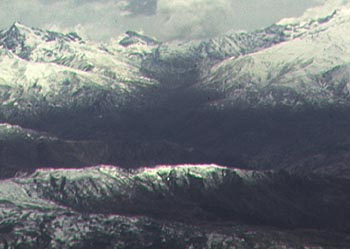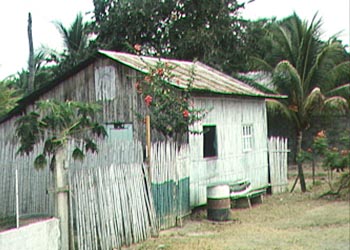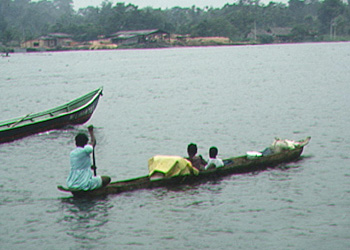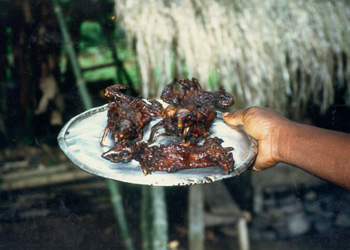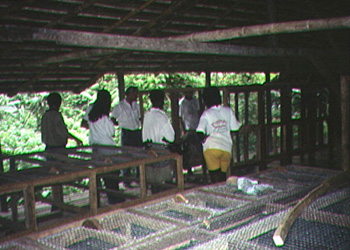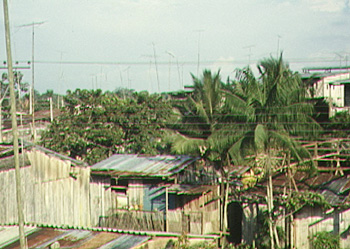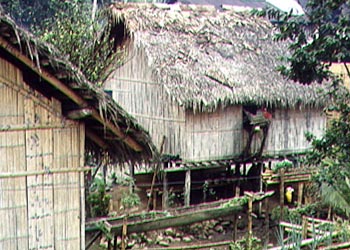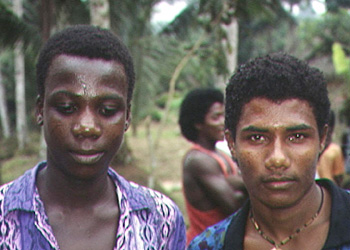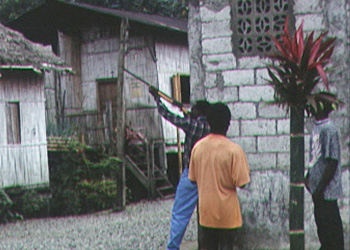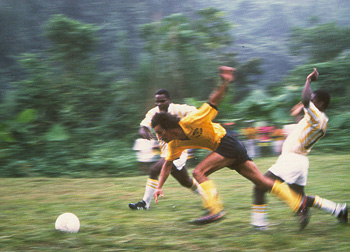These Ecuadorians dance way better than I do
We’d missed the plane to Esmeraldas from Quito. So then, in the enveloping equatorial darkness, we stuck all the video gear into one of the trucks and took off. I dreaded the coming 12 hours. I knew what the coming endurance test was all about – hours of dense fog and the constant perceptions of near accidents as we climbed over 13,000 feet and drove towards the Ecuadorian coast.
I didn’t know Pedro, but I was pretty sure I knew about his driving. Head lights always completely off except when passing, and passing itself bringing a knot to my stomach every time. It’s the situation I’ve come to dread. And five hours of it.
You’d think that a preparatory, diplomatic “safety†talk with Pedro might help. But it never works. The patterns are deep, and full-time drivers for aid organizations have great pride in their abilities. He’ll just get irritated and drive faster.
I sit in the front and busy myself with music selections. I met an Ecuadorian at the post office who invited me to his house to listen to music and make tapes. His living room was packed with an amazing collection of musical obscurities. I score one for the gringos as I snap in an old, hard-to-find album by the Ecuadorian folk singer Julio Jaramillo. My companions are impressed.
Later we’re back down to sea level, and I climb in the back, stretch my legs out, and luxuriate. Under a full moon we whip past wild scenes that belong in the Cameroon, not Ecuador. We pass a clearing – a subtle, momentary, deep vibration hits us as I glimpse Afro-Ecuadorians dancing within a hazy reddish hue. I snap my head around, but we’re gone. We whip by open air eateries – bamboo, thatch, playing cards, bottles, candle-lit plywood tables.
800,000 descendants of slaves live in this region, compromising the most impoverished and downtrodden of Ecuador’s population of 12 million. People talk about the slave boats that capsized off the shore 300 years ago.
The banana fronds overhead throw moon shadows on the narrow, straight road
Then I drive, and roll down the window some. The night’s fecundity – the warmth, the fragrance, a certain density – washes over me. My attention sharpens as the others in the back fall into their various oblivion’s.
Suddenly it’s here again, that state that only comes at those times in life when the natural sensory simulations are so powerful as to trigger frames of mind that are wonderful precisely for their non-linguistic, non-describable aspects. And I revel in it, completely awake, completely calm, completely engaged. There’s some real immediacy here.
The coastal city of Esmeraldas is on our left as we turn north for three hours on a mess of a mud track. When the mud gets bad, we drive through a bog and cruise for an hour on the beach itself.
Finally, the town of Borbon. Shanties shackled to the river shore punctuated by the wildest polyglot of overhead electrical wiring I’ve ever seen. It’s 5:30 a.m. and the town is up. Music plays. People are moving right along.
And ahh…. the smell. There it is again – my intoxication and addiction to that curious brew – diesel fuel, human waste, garbage, eucalyptus, building materials – that so marks many places within the developing world. Something about that smell throws me into a meta-state in which I climb up and stare down at the earth and marvel with disbelief at the utterness of it all.
This day is going to be fetid, dank, and probably downright broiling
We sit with our breakfast of fried bananas, trout, and RC Cola and watch the boy with his wheelbarrowed dead pig struggle by in the twilight.
We find the river shore. Borbon sits at the mouth of the Rio Santiago – the beginning of the next section of our journey. A dug-out canoe with a large, dented Yamaha motor sits. We’ve got to get up that river.
Up comes Carlos, who is under contract by The Organization to explore the feasibility of eco-tourism in the area we will visit. Up comes Lucho, a wildlife biologist. Up comes Rico, an expert in geographic mapping systems. He’s got some nifty mini-satellite gear with him. Yes sir, we’re going to do some development work.
The canoe gets packed to the gills. I sit on what I think are big gas cans wrapped in plastic that I later discover are custom stereo speakers. Up front are two boatmen, and in the back Lorenzo, our pilot. The northern boy that I am, I’ve got my hat, my glasses, my suntan lotion, my mosquito repellent, my little poncho, my aspirin.
So it’s up the river, into the rapids, taking in the latitudinal diversity gradient. As you move towards the equator, the number of species grow. Greenland has 56 species of birds, New York State 195, and the area I’m headed into, 1,525. Same concept with the plants, the insects.
Carlos and I talk. He got really sick up here a couple months earlier and went to a local witch doctor who said it was a case of “mal ojo.†Seems that an earlier presentation to villagers was too long and boring, and someone in the audience gave him the evil eye (“mal ojoâ€). Carlos is a highly educated Quito guy but definitely believed he’d got the mal ojo.
We pass a horrific sight – a small hand-paddled dug-out pulling a dead body towards the town in the distance. Everyone is waiting by the shore. We slow. The boatman shrugs, “It’s only some old man who drowned.â€
After five hours we arrive at Playa de Oro. This weekend is to be the yearly celebration of their patron Saint, Mercedes. The Organization has gotten them a generator, and I hear some roiling sound coming from around the river bend before we even see the town. But it’s not the generator. It’s The Drums! The Bass! The Trumpet Blasts!
We land, unload, say hi to half the town, and do some afternoon work
We look at the spiny rats (proechimys semispinosus) being domestically cultivated in the “zoalogeria†for eating and increasing the community’s protein source. We survey the forest to locate sites for the eco-tourism huts that may be built. I see how the satellite dish is used to mark property lines so that land can be registered with the government. We get video footage of the parade. Guys shoot down coconuts with rifles. We watch a soccer game as chiggers bite the hell out of my ankles.
The Organization has a Project here, with goals: “To identify, test, and develop in the field ecologically and socially sustainable resource management models in selected protected areas and their buffer zones and to preserve bio-diversity and improve the economic well being of communities through their participation in the management of natural resources.â€
But I’m not into the Project today. I’m into the music. It’s coming from everywhere. I’m drawn upward to it, and away from the mechanics of development, of helping, of being a Westerner looking upon it all.
I’m pretty wasted from no sleep the night before. By eight I’m a lost cause, and retire with plans to get up after a few hours. I think I feel okay after the spiny rat dinner. (I brushed off the tiny, tiny red ants crawling over the charred morsels.)
I look straight up into the mosquito net, heat swirling around me as I’m soothed and stimulated by omni-present rhythms. These structures are just wooden framed floors and ceilings – so the sound is right there, at me. Actually, it comes from right below and over there.
Could we talk development for a second? These “Playa de Oroiansâ€, if you will, have great music but no running water or sanitation systems. Should I have an opinion on this?
Am I being ethnocentric as a sense of faulty priorities sneaks up on me? I find myself thinking about walking around Borbon this morning, which was clearly a total hell-hole of a sanitary mess. But I swear that almost every house had a TV set sitting on the floor. Turned on. Not much else.
Do you know that they celebrate here when two week old babies die? These babies – “little angels†– have achieved the ultimate. They go straight to heaven with none of the inevitable hell on earth.
I contemplate my accumulated filth
I could clean up, but I’m scared to try to get myself to the river and back. Six weeks ago someone got bitten by a snake right down there and died within four hours.
FinalIy, I can’t resist the narcotic of those deep rhythms. I grope my way down steep stairs, fumble my way to a clearing – it’s about 2:00 a.m. What sound! It’s that equipment we hauled up the river, owned by a German guy living in Borbon who works on the Project.
Wow. What a dance. They’ve been doing this for a long time. My head is pounding from lack of sleep; I’m motioned in though. I hesitate, forward, backwards. But I shut down before ignition. I go back to my hut. The dancing ends at seven, and I wake at eight. I’m pissed both at myself for missing the night and at my peers because they really can stay up for two nights in a row.
Cut to Quito two weeks later. I want to get serious about dancing.
We wind past the residences of the Belgian and British ambassadors. Palm trees, yellowish light, soft white surfaces. The metallic glints of the Land Cruisers. Attached to the perimeter walls of these compounds are the shadowy wooden and cardboard things people live in.
Down to Avenida Colon. I climb out of the car. I’m too hip for discos, but this is a pure and simple disco. Forget your arty, your hip, your subtle. We arrive, and get trays of alcohol. I’ve got a wicked thirst and gleefully dig in.
Small dance floor, lights, lasers, smoke, video screens, loud. There are a bunch of us – me and the office workers from the Organization. I’m dancing with P. Villacis – who is all fluidity against my lumbering, coarse Norte Americano-ness. I’m wearing hiking boots.
Once in Asia, I met two women from Copenhagen who told me that “American men always have these sort of……†and then one made a gesture that seemed to be something about a squareness of face and chin, a certain broadness, maybe a certain coarseness. I had no idea what they meant, but they both tacked really nasty laughs on the comment. I remember this as I feel myself stuck to the dance floor.
But let me tell you about P. Villacis. I wish I had the poetry to describe her movement.
Then I remember some flight magazine article about how the way you learn how to play golf these days is to watch videos of great golfers and act as if you were them. “Become Arnold’s Swing†So I become P. Villacis. Or so I tried.
It’s a new song – a merengue – with its far faster tempo. And I move into a sense of exquisite proportion. I observe, I copy, I mimic. And I find myself suddenly approximating something new. My essential B average in life fades. I feel the world as potential, as eternity, as realized risk, as possibility, as endless options and choice and passion and integration. I laugh at myself as I feel myself right up against a novel, inspiring combination of powerful reality and deep cliche.
He who kisses a joy as it flies
Lives in eternity’s sunrise.
William Blake sidles up to the band Projecto Uno. Fleshy, ugly, bikini-clad girls are sneering down from the video overhead.
But then, after 90 minutes of transcendence, subtle transitions
A new and weird physical sensation is being registered. I sit down, and suddenly know I’ve got to go. I dazedly say good-by, and walk back to my hotel feeling really, really peculiar.
I lie down and it immediately am hit by the certainty that I’m going to be sick in some new way.
I rotate through the bed, convolutedly becoming wrapped in a mess of polyester and coarse wool. Suddenly I can’t escape those endless repetitions of sound and light that have been my last four hours.
I’m having to breath very deeply to get the air I seem to need. I theorize about dehydration. Is it my blood platelets not being packed with enough hemoglobin? Or my hemoglobin not packed with enough blood platelets? Every time I feel myself dropping off, I awake gulping for air. Quito is at 9,300 feet after all, I tell myself. Maybe that’s it.
I’m in the strangest, most unpleasant fugue state. Hour after hour of it. It just keeps going. What do I do? I’m not in a good place. I can hardly get to the bathroom. I can’t imagine negotiating medical attention. I’ll wait awhile. (I’m thinking in short sentences.)
I make myself wake, turn on the TV, and…… it’s a Julio Iglesias television special. He’s singing “Crazyâ€. You know, that song by Patsy Cline. It’s a Las Vegas wedding cake of a rendition. He pouts out little crescendoing phrases.
And it’s beautiful. No it’s not. It’s crap. What? Is it beautiful or not? In my stupor I feel some sort of truth about art as ultimately a personal aesthetic experience. But I’m really too sick to develop this logic. Then Julio sits with a Spanish Ed McMahon type and they toast each other with great gusto.
Then for a long time I don’t really think. Rather, its just unbelievably jumbled, mentally painful sensory experience. A sickness-induced glimpse into a tiny piece of the unfathomable and terrible world of real mental illness.
I’ve had it with these trips
I swear I’m going to forego all those awful and magnificent sensations and experiences that constitute tough travel. I’ll stay at home, and stick with the life I have there, with its narrow margins of modest pleasure and minor discontent. When I’m the tiniest bit cold I’ll put on the perfect little vest. When the sensation of hunger first touches me, I’ll run upstairs for a slice of ham.
Did I tell you about the young woman and fat old guy wearing the ‘She’s Not My Daughter’ T-shirt? They were videotaping the Shiva Ratri festival in Bhaktapur, Nepal. As the head of the water buffalo was chopped off, the blood flew up and drenched his camera.
What draws us to places so different? Is it the fascination with outlandish juxtaposition? Anyone can feel clever as they experience the coarse aesthetic of cultures interacting. It’s too easy. A lot of times it’s just cheap profundity, although mightily entertaining.
Another example: Vending machine message found in the Rapongi District of Tokyo, an area that comprises one of the most valuable, modern pieces of real estate in the world.
It’s a symbol mark of Juicy the style, like that of most innovating creafer, evolved as he grew older and with discernible internal Logic but for several reason its phases are splendid quality.
How is it that this ever got printed? What a great world!
Well, the fever and the angst lift together. My recovery coincides with a trip in the dark to the airport in some guy’s Pontiac.
I find myself alive again, exhilarated, as I feel the warmth and intelligence of the driver. There’s nothing more fun in the world than to sit next to him and talk about our families, his cab, his hopes, what we think of our governments, soccer…..
Then, we talk music. He tells me of the power that the Mexican boleros have to soothe the soul in times of sadness. He says it in a way that reconnects me with that memory, that “sense†that the world actually has all these people so different from us.
And I remember the basic imaginative challenge. What are these people’s lives really like? While the details are extraordinarily opaque, I know that the exercise of just trying is the work of furthering my own humanity.
I smile as the word tranquillo rolls from his lips. And I revel in this very moment as the mellifluousness of that sound drifts quietly by.

